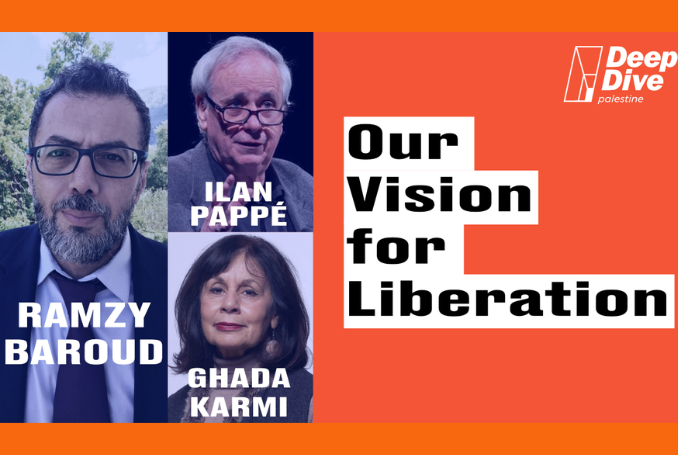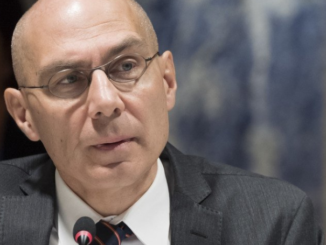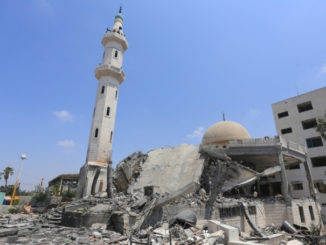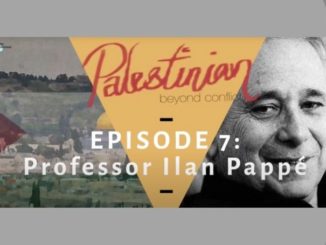
In its latest live show, Palestine Deep Dive celebrates the book launch of Our Vision for Liberation: Engaged Palestinian Leaders & Intellectuals Speak Out (Clarity Press).
Deep Dive’s host, Mark Seddon, is joined in the studio by the book’s co-editor Dr. Ramzy Baroud and one of its many Palestinian contributors, Dr. Ghada Karmi, joined via video link with co-editor Prof. Ilan Pappé.
Kicking off the show, Seddon asks Pappé what the idea was which inspired him and Baroud to put the book together:
“It was a sense that while there is a lot of information about the oppression, about the brutality of the Israeli policy, whether analyzing it in the past or understanding it in the present, there was a sense that the Palestinian agency in this is sometimes forgotten,” Pappé responds.
“I think also the obvious, disunity in the Palestinian leadership, a sense of disorientation that cannot be hidden is clearly there. Sometimes this obfuscates the very individual bravery and resilience that is taking place all over Palestine or wherever the Palestinians are in the globe. We thought that the first mission was to show, first of all, how this resilience, resistance, sometimes very personal, not as part of an organization, sometimes as part of a larger movement is a daily occurrence which gives us a lot of hope that there is still a Palestinian liberation movement, even if, from an institutional point of view, it seems sometimes that it does not exist.”
Asking Ghada Karmi for her thoughts on the title of the book, she responds:
“I must say it’s very brave, as you point out, to actually include the word ‘intellectual’ at a time and in a context in which there is an anti-intellectual movement. It’s very courageous, but it’s the truth. It’s the truth and it has to be said. Palestine, like many other nations, has its own class of people who think about things, which is what an intellectual is, and debate within themselves and with others what is the best way forward for whatever it is that they’re concerned about.”
Seddon probes further, asking, “When you talk about liberation as authors, what do you actually mean?”
Karmi responds: “… I think that there is this unity that Ilan Pappé spoke about in the idea, in the belief, that liberation means regaining Palestine. It’s very simple, no Palestinian ever really accepted the loss of the homeland. None of us ever believes or thinks that it’s gone forever.”
Dr. Ghada Karmi’s chapter in the book is titled: “An Equal Rights Campaign – Key to the End of Zionism” which she elaborates on in the show:
“We, that is not only the ‘we Palestinians’ who are living already in historic Palestine, but all the Palestinians who are living outside it or exiled or who are sitting in refugee camps, people like me, how can we accommodate this? How can we realistically do it? Quite clearly, there are no divisions. You can’t partition Palestine, the people have to live together. How are they going to live together? Ideally, of course, as one person, one vote in a democracy with equal rights.”
Returning to Seddon’s question on the title of the book, Baroud responds:
“We were thinking of liberation at two different levels, the actual act of liberation, the ending of the occupation, the dismantling of apartheid, and for Palestinians to be given basic human rights, to be treated as citizens in a territory that we can identify and the rest… but there is also a different kind of liberation that we were aiming for. This is why I think some of our 30 contributors may have discussed liberation from a different point of view, which is the liberation of the discourse itself, the liberation of the language itself, the liberation of how we locate ourselves as Palestinians.”
Baroud progresses by emphasizing the misrepresentation of Palestinians historically and how this book seeks to undo this injustice by giving Palestinians center-stage to articulate their own discourse:
“We’re always, in some ways, being perceived to be the aggressor, which makes absolutely no sense given that we are the ones who are colonized and aggressed upon and constantly trying to fight, not only for the freedom to move about, but for our own survival as we have seen in the case of Gaza.”
Currently in Gaza, where two million Palestinians endure a 15-year-long hermetic siege, 98% of water there is undrinkable, electricity is shut off daily due to power shortages and a mental health crisis afflicts the population who have lived through four deadly military assaults on the enclave by Israel since 2008.
“We wanted to say if we as Palestinians imagine a different narrative in which the story is told from our point of view, what would it look like? What would the story be if it’s based entirely on Palestinian priorities? Not in a cliché sentimental way, but rather in a very specific way, people with programs.
“Ghada was quite courageous in her chapter. Others also talk on various issues, whether in art and cinema, in embroidery, in science, in archeology, in diplomacy, and all of these issues talking about them; this is how we have been doing it, this is what we learned, these are the mistakes that have been committed, this is what we think is the proper way forward.”
Expanding on the idea of liberating the discourse, Baroud explains how Palestinians historically have been denied the right to speak freely:
“When Oslo was signed in 1993, we quite often talk about Oslo as a political doctrine, but we rarely discuss Oslo as a culture. Where Palestinians were told that in order for you to be accepted within the realm of good moderate nations, you have to behave in a certain way and you have to speak in a certain way as well.
“Certain terminologies like liberation, freedom fighting, resistance, muqawama, we were not allowed to use those terms anymore. The terms that we were supposed to use, ‘the peace process’ only ‘two-state solutions’, we can’t venture out of this stifling paradigm that was really never meant to actualize in the first place. There were the good Palestinians, the bad Palestinians, the terrorist sympathizers versus the moderate friendly one.”
Returning back to Pappé, Seddon puts to him an audience question, “Is this book a manifesto for change or a history of what has already been tried?”
Pappé responds: “Well, I think it’s both. First of all, it’s a record. It’s recording through individual stories. A humanizing story.”
“I would just mention one thing here that is very important, and this comes out in several of the contributions. The Palestinian society is one of the youngest in the world. 50% of the Palestinians, wherever they are, are under 18 years old.
“You talk to Palestinian teenagers all over, wherever they are, and you understand that this is an assertive generation that would continue the struggle of liberation. With the way Israel is going to evolve, it’s very clear what’s going on on the ground in Israel. The way it’s going to evolve, giving up on the democratic charade anyway, and really becoming an official apartheid state. I think that this is more than a manifesto.”
Keen to emphasize one of the book’s vital takeaways, Baroud mentions:
“There is an implicit message in the book about solidarity. In fact, if you notice that all the endorsements come from non-Palestinians, and all the contributions come from Palestinians. As if we are trying to say there’s a message there.
“Solidarity is not when you take my place, solidarity is when you stand by my side and try to create networks, support me, help me to communicate my message, but not to replace me. I think that becomes quite clear throughout the book.”
Turning to the question of the Palestinian leadership, Seddon asks with the abandonment of elections recently in Palestine, is it indeed possible to create a unified Palestinian leadership any time soon?
Baroud responds: “Now, according to a recent public opinion poll, a majority of Palestinians in the West Bank support a one-state solution. That critical mass is about to be reached in Gaza. That happened within relatively a very short period of time. If these indicators continue, at this level, it seems that sooner or later, Palestinians will back this particular solution, and we will then speak about an objective that is being championed by the Palestinian people.”
According to a poll conducted by the Jerusalem Media and Communication Center (JMCC), published on November 22, 2021, there are more West Bank Palestinians who support the one-state solution than those still in favor of the two-state solution.
“Now, the question is, will we ever have that leadership that is going to support the people’s position? Edward Said famously said, ‘Palestinians are cursed by a bad leadership.’ Far from trying to correct Professor Said in any possible way, but I don’t think it’s really a matter of bad leadership per se, as much as we had no other alternative but to have that bad leadership, because our good leadership is either in prison, assassinated, marginalized, deported out of Palestine, and so forth.
“This is the very purpose of the book. How do we move beyond this? How do we create that legitimate leadership? Not necessarily via elections, because we know that Israel is not going to give Palestinians the space and the room to really create democratic representatives. Even though the elections have never even taken place, many Palestinian potential candidates were arrested anyway. We know that either way, we will never have that moment. We need to have alternative ways in which we can have a legitimate leadership. Within the framework of liberation movements, legitimate leadership does not necessarily have to be the outcome of the ballot box. There are other ways of achieving that.”
Order your copy now of Our Vision for Liberation: Engaged Palestinian Leaders & Intellectuals Speak Out here.
(Palestine Deep Dive)








it seems obvious to me that a real Leader needs to step up, get rid of the old guards and start leading the people, without being assassinated by Israel or fellow Palestine power brokers !!
until that happens and a Nelson Mandela person inspires the people nothing will change except more and more loss of freedom